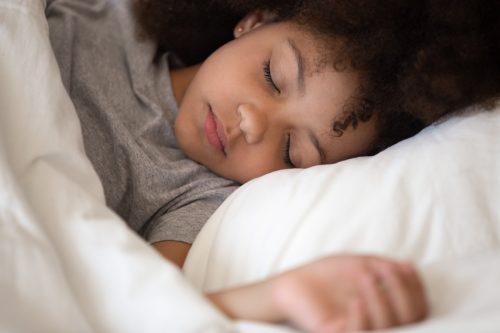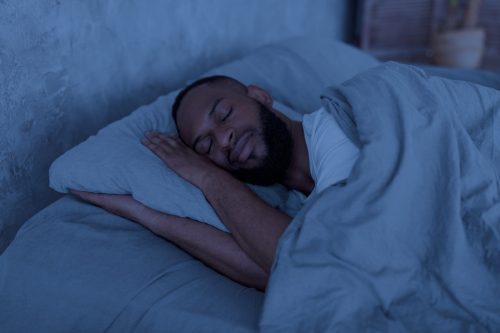3 Ways Your Bedding Is Hurting Your Health, According to Experts

Not many things are better than sliding between freshly laundered bedding when you’re going to sleep—sheets somehow crisp and soft at the same time, topped with a fluffy comforter perfect for snuggling into and drifting off into dreamland. But if you’re not getting as good a night’s sleep as you wish, could your bedding be to blame?
Getting plenty of sleep, as most of us know, is key to our physical and mental health, and when picking out sheets, duvet covers, and even your mattress, choosing the right material can make a big difference to the quality of your rest. The Sleep Foundation reports that more than 35 percent of adults in the U.S. get an insufficient amount of sleep each night. If you’re among them, you might be surprised to find out that swapping out your bedding could be a more effective sleep strategy than counting sheep.
Read on to find out three ways your bedding could be impacting your sleep—and therefore hurting your overall health.
READ THIS NEXT: If You Sleep in This Position, You Could Be Hurting Your Spine, Experts Warn.
1
It’s making you sweat.

If you’ve ever woken up feeling cold and clammy, with your sweaty pajamas clinging to you, then you know how miserable it is. For people who suffer from night sweats, whether as a symptom of menopause or a result of chronic nightmares, sleeping with the right bedding can provide relief.
“Moisture-wicking and temperature-regulation are great qualities to look for if you are a hot sleeper,” Amelia Jerden, a sleep accessories specialist at Sleepopolis, tells Best Life. “Moisture-wicking essentially means that the fabric won’t feel damp when it absorbs moisture. So if you sweat a lot at night, having moisture-wicking bedding makes a big difference.”
Lauri Leadley, founder and president at Valley Sleep Center, adds: “For the best night’s sleep, consider cotton linens and a wool blanket on top. Cotton sheets sleep cool, making them a great pick for hot sleepers. However, the weight of a wool blanket on top can keep you warm and cozy at night. The trick is to choose a breathable material against your skin.”
2
It’s aggravating your allergies.

It may come as a surprise to learn that no matter how many times you wash your sheets, you may be sleeping with a bunch of tiny insects that are too small to see called dust mites. “Dust mites live on bedding, mattresses, carpets, curtains, and upholstered fabric,” the Cleveland Clinic explains. “They feed on the dead skin cells that you and your pets shed.”
Besides being gross (try not to think about it too hard), many people are allergic to these creepy critters. The Clinic says that approximately 20 million people in the U.S. suffer from a dust mite allergy, and list coughing, congestion, sneezing, a runny nose, and itchy eyes among the symptoms.
If this sounds familiar, wool bedding may help. “Wool is hypoallergenic, which means it is less likely to cause an allergic reaction. Additionally, wool fibers are naturally resistant to dust mites and other allergens, making it a great choice for those with allergies,” says Marc Werner, the CEO and founder of GhostBed.
That’s right, wool. You may think of wool as warm, and therefore a winter-only material, but that’s not the case. “Small pockets of air in wool fibers circulate heat, allowing more heat to move towards the body when you’re cold—that’s why wool is so warm,” the experts at Woolroom explain. “These small pockets make wool breathable, which means they’ll also move air away from you when you’re hot.”
Leadley adds that in addition to wool, “Cotton sheets are also hypoallergenic and made of natural fibers, so they are a great choice for sleepers with sensitive skin.”
3
It’s filled with toxic chemicals.

Much of our bedding is treated with chemicals to make it flame-retardant or flame-resistant. These chemicals are potentially toxic, and have been linked with cancer and other diseases. If this concerns you, consider a natural material that also keeps you safe. “Wool is commonly used in natural bedding products as a flame barrier,” says Jerden.
Concerned that wool bedding, like certain wool sweaters you may have worn as a child, might be itchy? Go high-end when you shop and invest in merino bedding. “Wool is itchy if it’s low-quality,” the experts at Woolroom explain on their blog. “Choosing the right wool makes all the difference… Merino wool isn’t itchy and is one of the best types of wool to prevent scratching.”
For more health news sent directly to your inbox, sign up for our daily newsletter.
The right bedding can help boost your health.

It’s well known that sleep is vital to our health. Study after study shows that getting the right amount of sleep at night helps prevent everything from dementia to heart disease. So it makes sense that anything which helps you get those uninterrupted zzz’s is going to boost your overall health.
“People spend 27 years of their life asleep; better health starts with bedroom health,” Chris Tattersall, clean sleep expert and managing director of Woolroom, tells Best Life.